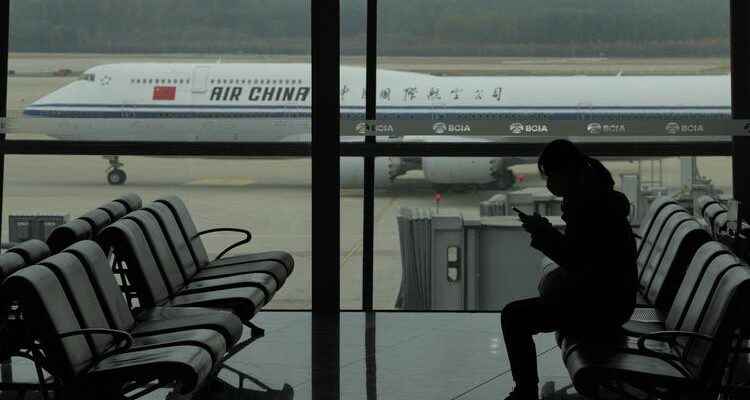After almost three years, China will open up to the world again from January 8, 2023. The zero-Covid policy should finally be history. But tourism is not planned for the time being.
International air travel in China this year is 96 percent below 2019 levels.
The Chinese government announced the extensive opening of the national border late Monday evening announced. From January 8, 2023, there will no longer be any quarantine for those entering the country. All that is then necessary is a negative Covid 19 test within 48 hours before departure. An eight-day quarantine still applies to all travelers. It was three weeks until June, in some cities even longer.
China’s borders have been largely closed since March 2020, when the World Health Organization declared the corona epidemic a pandemic. Chinese do not receive new passports and are only allowed to leave the country to work or study. Valid visas for foreigners were cancelled, new ones were only issued to a very limited extent for working or studying. Many expats who once worked or studied in China remain stranded abroad.
96 percent fewer international flights
The abolition of the entry quarantine does not mean an immediate return to normality. Furthermore, there are hardly any international flights. This year it is 96 percent less than in the pandemic-free year 2019, reports the data company Variflight. From Switzerland there is currently no direct flight to mainland Chinaonly one to Hong Kong.
However, the major Chinese airlines have announced in recent weeks that they will resume international routes and open new ones. China Southern, for example, also wants Shanghai in the future fly to Frankfurt and Paris. At the request of the NZZ, Swiss announced on Tuesday that it would only fly pure cargo connections to Shanghai and Beijing from Zurich until further notice. “It is important for Swiss to be able to carry out any passenger flights in the long term with the necessary operational stability.”
China’s national health commission has removed an important hurdle to resuming international flights. For example, flight connections on which there were at least five people infected with Covid 19 on a plane should no longer be temporarily suspended in the future. The issuing of visas for foreigners is also to be explicitly “optimized”. However, tourism is not mentioned among the reasons for travel, only work, study and family reunification.
For the Chinese, international travel opportunities are even more uncertain. The National Health Commission only mentions them in a vague sentence in Monday’s regulation. According to this, the departure of Chinese citizens will be “properly resumed”, but only in accordance with the international pandemic situation and the “capacity to guarantee services”. The government of the Hong Kong Special Administrative Region had previously announced that the border with mainland China would be opened from mid-January.
Japan tests Chinese travelers
Chinese travel portals reported a surge in search queries after Beijing’s new rules were announced. China’s main stock index CSI 300 rose on Tuesday by more than one percent, but remained close to the low for the year at the end of October. Japan meanwhile announced that all travelers from China will be tested for Covid-19 – and if they test positive quarantined for seven days.
The extensive opening of the Chinese border should fuel the discussion about possible new virus variants from China. Some experts had previously warned of this possibility, but others predicted that new variants will most likely be milder than previous variants. The corona virus has been spreading rapidly in China since the surprising end of “zero Covid” on December 7th. In a leaked internal estimate, the National Health Commission assumed 248 million infections in the first twenty days of December.
The government justifies the extensive opening of the border with the fact that the virus is becoming less and less dangerous. Asymptomatic infections and mild cases accounted for more than 90 percent of cases, while severe and fatal courses are extremely rare, according to the regulation. China has not reported a single Covid 19 death in the past few days due to a very narrow definition, but the data company Airfinity assumes more than 5,000 Covid 19 deaths every day.
Fewer corona tests in hospitals
Beijing officially downgrades Covid-19 from “pneumonia” to “infection”. In the same way, the control measures are reduced from category A to category B. Infected people should no longer be isolated, contacts should no longer be traced, and infected areas should no longer be declared risk areas. Even in hospitals, corona tests should no longer be carried out on all patients and employees.
Nevertheless, the government is calling on all subordinate administrative levels to monitor the infection process in the population and in “key institutions”. How this is to be done largely without tests and other data is unclear. Despite all the easing, Beijing is also explicitly calling for crowds and freedom of movement to be restricted in order to curb the exploding number of infections.
Although the unprepared end of the zero-Covid policy is causing hospitals and crematoria to be overwhelmed in many places, and even simple medicines such as ibuprofen are scarcely available, the government continues to celebrate its fight against the pandemic as the best in the world. China has created a miracle of prevention and control in “the history of the human fight against disease,” according to Monday’s regulation. As is usual in China, the first guiding principle is the ideas of party and state leader Xi Jinping on “socialism with Chinese characteristics for the new era”.
